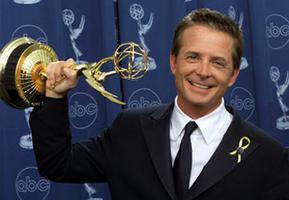
Early Life and Career
Michael Fox, the son of an army dispatcher, moved among various towns until his father retired and the family settled in Burnaby, British Columbia, in the early 1970s. At age 12 he appeared in an episode of The Beachcombers and at 15 he starred alongside Brent Carver in the short-lived CBC sitcom Leo and Me, shot in Vancouver. In 1979 he landed a role in Letters from Frank, his first movie made for American television, and in 1980 he had a leading role in the Disney-produced Midnight Madness.
Family Ties
Fox moved to Los Angeles to pursue a career in television, and added the letter J as his middle initial when it became necessary to distinguish himself from another Michael Fox listed in the American Screen Actors directory. (Reluctant to use his middle initial “A” due to the double meaning it leant his name — “Michael, a fox!” — he instead used a J as an homage to character actor Michael J. Pollard.) He was days away from returning to Vancouver when he landed the part of Alex P. Keaton in what turned out to be the popular and long-running NBC TV series Family Ties (1982–89). Keaton's cute, preppy Republicanism contrasted sharply with the values of his hippy parents but was in tune with then-president Ronald Reagan 's vision of American youth. The part made Fox a major television star, with three consecutive (1986, 1987, 1988) Emmy Awards for outstanding lead actor in a comedy series, as well as nominations in 1985 and 1989. Fox also won the Golden Globe Award in 1989 for best performance by an actor in a comedy/musical TV series.
Back to the Future
While still making Family Ties, Fox attained movie-star status in 1985 with two films, Teen Wolf and, especially, Back to the Future, a huge theatrical hit worldwide that was followed by sequels in 1989 and 1990. Due to the actor's commitment to Family Ties, Fox's agent initially turned down the role of Back to the Future's Marty McFly. The part went to Eric Stoltz, but director Robert Zemeckis was unhappy with Stoltz's performance and the part was again offered to Fox. This time the agent relented and Fox shot his scenes in Back to the Future after full days of work on the set of the TV series.
Other Films
A succession of films followed in the late 1980s, and the energetic actor bursting with friendly charm became one of the most popular screen personalities in the United States. He also demonstrated an ability to deal with serious roles, as in Light of Day (1986) and, perhaps most famously, Brian De Palma's Vietnam War film, Casualties of War (1989). However, the critics were not as pleased with Fox's dramatic prowess and he wisely stayed within his light comedic range in the 1990s with The Hard Way (1991), Doc Hollywood (1991), Life with Mikey (1993), The American President (1995), The Frighteners (1996) and Mars Attacks! (1996).

Spin City and Other Work
With the onset of Parkinson's disease — a fact publicly revealed in 1998 — and a film career that had peaked 10 years earlier, Michael J. Fox returned to television in the ABC comedy series Spin City (1996–2002). He played Mike Flaherty, a wily political handler and deputy mayor of New York City. Once again Fox was in a hit, and this time he was one of the show's producers. In 1997, he won the People's Choice Award for favourite male performer in a new TV series, and he received four Emmy Award nominations for outstanding lead actor in a comedy series, winning in 2000. The Golden Globe Awards named him best performer in a comedy/musical TV series in 1998, 1999 and 2000, and the American Screen Actors Guild awarded him outstanding performance by a male actor in a comedy series in 1999 and 2000.
When symptoms of his Parkinson's disease became noticeably worse, Fox retired from Spin City after its fourth season. He voiced the character of Stuart Little in the animated/live-action films Stuart Little (1999) and Stuart Little 2 (2002). He was nominated for an Emmy Award for his guest role on Boston Legal in 2006 and won an Emmy for his guest role on Rescue Me in 2009. He has also appeared in a recurring role in The Good Wife (2009–) and returned to television full-time with the short-lived NBC sitcom The Michael J. Fox Show (2013–14), about a news anchor who puts his career on hold after being diagnosed with Parkinson’s disease.

Publications
Michael J. Fox has authored three books — Lucky Man: A Memoir (2002), Always Looking Up: The Adventures of an Incurable Optimist (2008), and A Funny Thing Happened on the Way to the Future: Twists and Turns and Lessons Learned (2010).

Advocacy and Recognition
He has been a vocal advocate for stem-cell research through his US–based Michael J. Fox Foundation for Parkinson's Research and has received honorary degrees from New York University, the University of British Columbia and Karolinska Institute in Sweden. He was inducted into Canada's Walk of Fame in 2000 and received a star on the Hollywood Walk of Fame in 2002; in 2010, he was made an Officer of the Order of Canada. He was awarded Germany's Golden Camera Award for on- and off-screen lifetime achievement in 2011.

 Share on Facebook
Share on Facebook Share on X
Share on X Share by Email
Share by Email Share on Google Classroom
Share on Google Classroom
